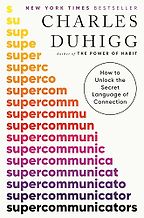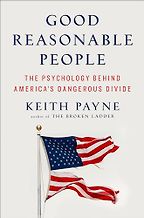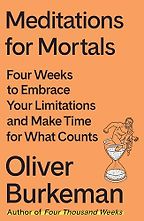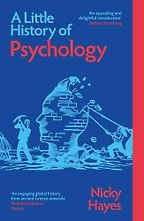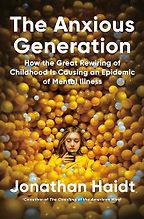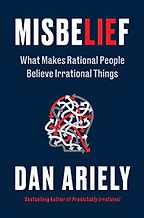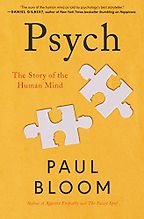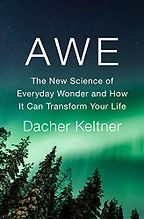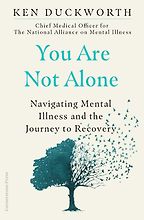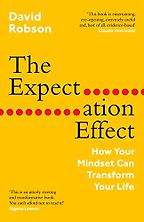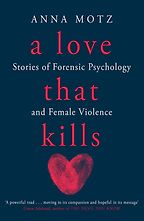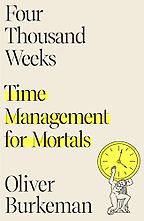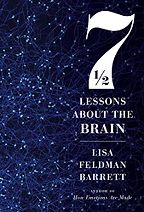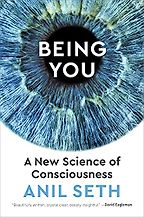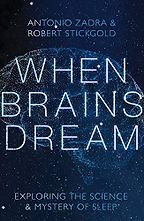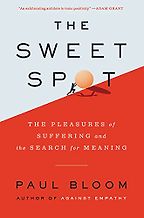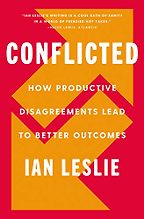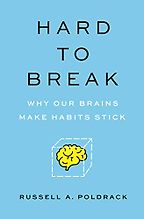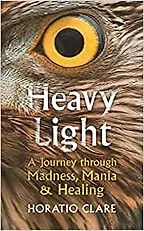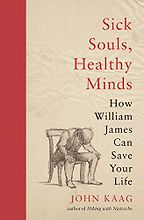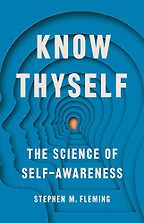New Psychology Books
Last updated: February 07, 2025
There are lots of interesting new psychology books coming out, as psychologists try and inform the public about the latest findings, whether the topic is happiness and mental health or depression, conflicts with other people or bad habits and time management. They're written in a way that draws on research but is accessible to the general reader. We've selected those that have come to our attention below.
We are lucky to live in an age when talking about mental health struggles is no longer taboo, and we've also included books that chronicle personal experiences, such as the book by Horatio Clare, a British travel writer, about his struggle with manic depression: Heavy Light: A Journey Through Madness, Mania and Healing.
“Johnny Heller’s moving performance of this excellent audiobook is never out of sync with the shifting moods and overall poignant content offered by the articulate congressman and his cowriter. The authors recount the stories of 12 prominent people with psychiatric disorders as they struggled to manage their symptoms, seek help, and integrate their conditions with their work and personal relationships.” Read more...
“He highlights the importance of understanding what the intention of another’s communication might be, so that we can respond in kind, and respond with kindness. Understanding the intention behind another’s communication equips us to respond more appropriately.” Read more...
The best books on Being Kinder to Yourself and Others
Ross White, Psychologist
“Keith Payne’s Good Reasonable People feels very timely: it’s a study of partisanship in contemporary America, from the perspective of a social psychologist from rural, Christian Kentucky whose own family splits along political lines. We have, he argues, ‘psychological immune systems’ that swing into action to neutralise information that threatens our self-identity and beliefs. In this way, we may all believe our tribe to be the good, reasonable people of the title—and those who disagree with us to be reckless fools.” Read more...
Notable Self-Help & Psychology Books of 2024
Cal Flyn, Five Books Editor
“Meditation for Mortals, again asks us to—respectfully—get a grip, to accept where we are in our lives rather than living in a fantasy land, and to understand that there will never be a golden day when we finally ‘get on top of things’ and live correctly. He calls on us to reflect on ‘the liberation of defeat’ and ‘the futility of becoming a better person.’ If that sounds gloomy, maybe it’s not the right book for you, but if you are anything like me—that is, an all-or-nothing kind of person who strives for perfection and then jacks it all in when they inevitably fall short—then it might just be the book that will change your life.” Read more...
Notable Self-Help & Psychology Books of 2024
Cal Flyn, Five Books Editor
A Little History of Psychology
by Nicky Hayes
Part of the Little History series, published by Yale University Press
“A Little History of Psychology by British psychologist Nicky Hayes takes psychology from its study under the Greeks to the present.” Read more...
Notable Nonfiction Books of Mid-2024
Sophie Roell, Journalist
“Social psychologist Jonathan Haidt (The Coddling of the American Mind, The Happiness Hypothesis) has a new book out, The Anxious Generation, which has been a huge hit in the United States, sitting on the bestseller lists for weeks. In it, he argues that the age of the smartphone has royally messed up our adolescents. ‘Continuous access to social media, online video games, and other internet-based activities’ disturbs their sleep, fragments their attention, and acts, effectively, as an addictive substance. He links the rise of social media to a spike in mental illness and anxiety.” Read more...
Notable Self-Help & Psychology Books of 2024
Cal Flyn, Five Books Editor
“Serves as an accessible and highly readable overview of the field of psychology. It draws from his immensely popular introductory psychology class at Yale, reportedly one of the university’s most popular courses of all time. In it, he leads the reader through the work of early researchers (including Pavlov’s dogs and Skinner’s pigeons), into a discussion of the malleability of memory and emotion, and the complex questions surrounding consciousness. It would be perfect for the curious layman or a switched-on school leaver considering a degree in psychology.” Read more...
Notable Psychology and Self-Help Books of 2023
Cal Flyn, Five Books Editor
Awe: The New Science of Everyday Wonder and How It Can Transform Your Life
by Dacher Keltner
Awe is by Dacher Keltner, a professor of psychology at UC Berkeley. It's not the first book suggesting 'awe' as a possible solution to all our problems (see, for example, Awe by Paul Pearsall), but it's trying to put it on a scientific footing. Early on, Keltner provides a good definition of what awe is: "Awe is the feeling of being in the presence of something vast that transcends your current understanding of the world." This is a highly readable, accessible book and even if awe turns out not to be your cup of tea, it's a really interesting study of/reflection on a seemingly ineffable emotion.
You Are Not Alone: Navigating Mental Illness and the Journey to Recovery
by Ken Duckworth
You Are Not Alone is a good book to look at if you or someone you love is struggling with their mental health. It's by American psychiatrist Ken Duckworth, Chief Medical Officer of the National Alliance on Mental Illness (NAMI). The book aims to be a practical guide, combining the latest evidence or advice from scientific research with examples of what some people are actually going through (starting with Duckworth's own family experience). Mental illness is a big challenge and Duckworth is candid about the limitations of current knowledge. He writes, "We know that mental illnesses are real, and common, but they emerge from a brain with about 100 billion neurons (give or take a few billion) that we do not yet fully understand." Chapters include "Do I Need Help?" or "Helping Your Child, Teen or Young Adult." There's also a section "Experts Answer the Most Frequently Asked Questions."
What Mental Illness Really Is… (and what it isn’t)
by Lucy Foulkes
Out in paperback and with a new title, What Mental Illness Really Is (and what it isn't), is by academic psychologist Lucy Foulkes. It's an important look at what we know about mental illness and what we don't, and a call to increase public understanding of mental health so that we're all better equipped to help people.
The Expectation Effect: How Your Mindset Can Transform Your Life
by David Robson
Mind really does have power over matter, and if you didn't believe that before, this book sets out to prove it, reporting on the latest research and experiments.
A Love That Kills: Stories of Forensic Psychology and Female Violence
by Anna Motz
A Love That Kills is by Anna Motz, a forensic psychotherapist who has spent the last three decades working in prisons. This book tells the story of 11 women, and how they came to commit violent crimes.
Four Thousand Weeks: Time Management for Mortals
by Oliver Burkeman
***🏆 A Five Books Book of the Year ***
“It’s a book about what we do with our limited time on Earth, how we decide to prioritise and proportion our time. To that extent it’s a book of ethics in the face of inevitable death. It’s a combination of sometimes witty, sometimes terrifying exploration of the human condition, and at the same time an antidote to those time management books that tell you how you can maximise your productivity, taking on more and more tasks and completing them efficiently.” Read more...
The Best Philosophy Books of 2021
Nigel Warburton, Philosopher
7½ Lessons About the Brain
by Lisa Feldman Barrett
7½ Lessons About the Brain falls into that most wonderful of modern book genres, the 'neuroscience beach read.' Published in the US in 2020, the beautiful UK edition came out in March, 2021. Lisa Feldman Barrett, a leading psychologist and neuroscientist, spoke to us about books about emotions. If you'd like to hear her voice, she narrates the audiobook of 7½ Lessons About the Brain herself.
“It’s a book about the nature of consciousness, one of the most intractable problems that human beings have come across. How do we understand how we, as apparently material beings made of flesh and bone—and, in particular, millions of neurones—get to the position of having qualitative experience, through the experience of the world through our senses, reflection and experience? Beautifully written, easy to read, hard to put down. It’s passionate, and it’s not patronising.” Read more...
The Best Philosophy Books of 2021
Nigel Warburton, Philosopher
When Brains Dream: Exploring the Science and Mystery of Sleep
by Antonio Zadra & Robert Stickgold
In When Brains Dream Tony Zadra, a professor at the University of Montreal, and Bob Stickgold, a professor at Harvard Medical School, bring us up to date on what the latest scientific research says about dream and dreaming, ending our reliance on popular wisdom based on what Freud wrote more than a century ago. It's written in an (overly?) friendly style—almost as if you had met them at a drinks party and they were telling you all about their research—but it's really informative. If you're interested in sleep in general, the authors also recommend Why We Sleep, the bestselling 2017 book by Professor Matthew Walker, a neuroscientist and psychologist at UC Berkeley.
The Sweet Spot
by Paul Bloom
The Sweet Spot is by Yale psychologist Paul Bloom, author of How Pleasure Works. It's about happiness in the broadest sense (what might be called 'eudaimonia') and the part pain and suffering play in it. Bloom is constantly doing experiments and reading about experiments that others are doing on issues of happiness, morality, pleasure, pain etc. and the book is full of these. He then throws in quotes and views from literature—Shakespeare, the Epic of Gilgamesh, Brave New World), songs, Twitter. Even the acknowledgements are funny: "Daniel Gilbert deserves special mention for nearly persuading me that the whole idea of this book is deeply confused. (He did this once I had finished writing it—thanks, Dan!)"
Conflicted: How Productive Disagreements Lead to Better Outcomes
by Ian Leslie
Conflicted by British journalist Ian Leslie is a thought-provoking look at what recent research says about arguments, mostly at a personal level, though public personalities and events are brought in to illustrate some of the main points. Disagreements, it turns out, make for better relationships, more accurate Wikipedia pages, and even helped in the discovery of DNA. The key, then, is to get better at having them. Leslie lays out some practical tips of how to achieve that, including the example of Nelson Mandela, who won over a sworn enemy by inviting him to tea.
Hard to Break: Why Our Brains Make Habits Stick
by Russell Poldrack
In Hard to Break: Why Our Brains Make Habits Stick, Stanford psychologist Russell Poldrack explains the science that makes us unable to give up bad habits even when we really want to. He also offers some possible solutions.
Heavy Light: A Journey Through Madness, Mania and Healing
by Horatio Clare
Memoirist and bestselling travel writer Horatio Clare tells his story of what it was like to go mad, in what looks to be a heartbreaking, funny and invaluable look at what it's like to live with manic depression.
Sick Souls, Healthy Minds: How William James Can Save Your Life
by John Kaag
William James, one of the founders of pragmatism and empirical psychology, struggled with the question of what made life worth living. In this book, philosopher John Kaag—who spoke to us about the best books of American philosophy—explains how James's ideas can help those of us who struggle with the same question.
Know Thyself: The Science of Self-Awareness
by Stephen Fleming
Know Thyself: The Science of Self-Awareness by cognitive neuroscientist Stephen Fleming is a scientific, philosophical, and practical book that sheds lights on 'metacognition'—our thoughts about thoughts and the importance of self-awareness to almost anything we embark on.
-

1
The Anxious Generation: How the Great Rewiring of Childhood Is Causing an Epidemic of Mental Illness
by Jonathan Haidt -

2
Meditations for Mortals: Four Weeks to Embrace Your Limitations and Make Time for What Counts
by Oliver Burkeman -

3
Good Reasonable People: The Psychology Behind America's Dangerous Divide
by Keith Payne -

4
A Little History of Psychology
by Nicky Hayes -

5
Supercommunicators: How to Unlock the Secret Language of Connection
by Charles Duhigg
Notable Self-Help & Psychology Books of 2024, recommended by Cal Flyn
Notable Self-Help & Psychology Books of 2024, recommended by Cal Flyn
Five Books deputy editor Cal Flyn offers a concise round-up of the most notable newly released psychology and self-help books of 2024, taking in a study of partisanship in Trump's America, a strongly-argued case against 'the phone-based childhood,' and a manual for improving your own communication skills.

